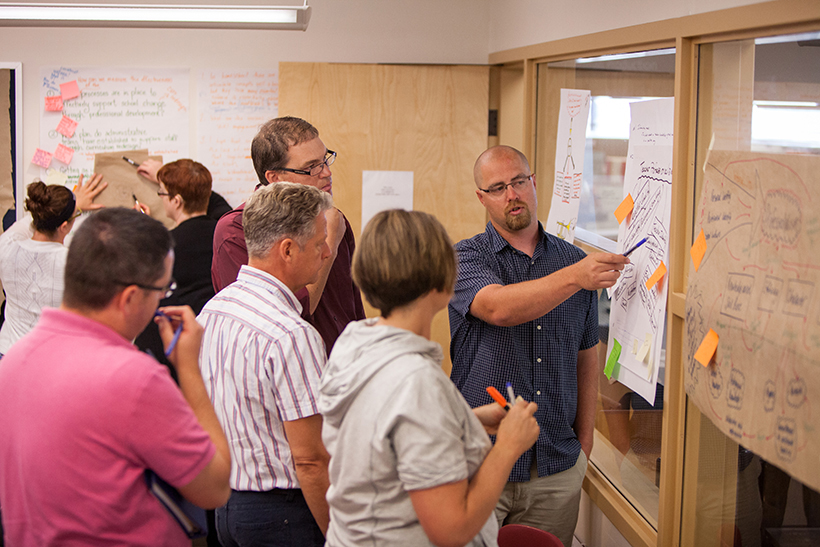This post is an excerpt from the article “Academic Freedom, Contingency, and the Place of Professional Learning Communities “ by Alexis Teagarden, from Forum: Issues about Part-Time and Contingent Faculty. This issue of Forum appeared as a special section in the May 2018 issue of Teaching English in the Two-Year College. Read the full article.
A Conclusion in Progress
Approaching professional development as a way to sustain academic freedom for composition’s contingent faculty members requires a determined optimism: “To call ourselves hopeful is perhaps imprecise. Resolute is better,” explain Kahn et al.
Moving professional development out of a surveillance or remediation frame necessitates letting go of oversight and requires trusting in faculty to make good use of their time.
Emphasizing the professional—rather than remedial—aspects of faculty development does not, however, require surrendering all methods of review. Instead it embraces the “slow agency” approach defined by Laura Micciche. Changes arising from professional development are likely incremental—changes in classroom practice and student work that blossom over time.
Nor will PLCs alone guarantee academic freedom’s permanence; they cannot sweep away the deep structural injustices of higher education’s labor practices.
What PLCs offer is a concrete program of professional development, one that fosters cross-faculty conversations and grounds claims of expertise in shared disciplinary knowledge.
The design foregrounds problem solving, where everyone’s perspective is valued. It resists ranking faculty by academic hierarchy and instead encourages a communal sense of professional identity; it brings contingent faculty into conversation with the whole of their department and with the larger field.
These moves break from the apprentice model and break through contingency’s isolation. PLCs cultivate a community of experts, which can, in turn, support all members’ claims to academic freedom.
PLCs are a relatively new idea in academia, but the idea that universities should commit to teaching and to their teachers is not. In reading previous works on academic freedom, I frequently came across John Dewey’s response to early infringements on faculty self-determination. Among the points in his “Academic Freedom” essay was a lament: “The great event in the history of an institution is now likely to be a big gift, rather than a new investigation or the development of a strong and vigorous teacher” (11).
Scholars usually underscore how Dewey’s concern about donors still resonates. But I find similarly striking Dewey’s preferred markers of university achievement, which place teacher development on equal footing with scholarly research.
What might it mean for our field if we fully committed to the developmental aspect of a teacher’s career-long work, aiming to sustain “strong and vigorous” teachers and in doing so cultivate the ground in which academic freedom thrives?
*For works cited, view the full article.
Alexis Teagarden is an assistant professor of English at the University of Massachusetts Dartmouth. She directs the first-year English program, which is currently piloting PLCs. Her research interests include undergraduate research skills and information literacy, writing assessment, faculty development, and the rhetoric of education reform.
Forum: Issues about Part-Time and Contingent Facultyis published twice annually (alternately in the September issue of CCC and the March issue of TETYC) and is sponsored by the Conference on College Composition and Communication.

